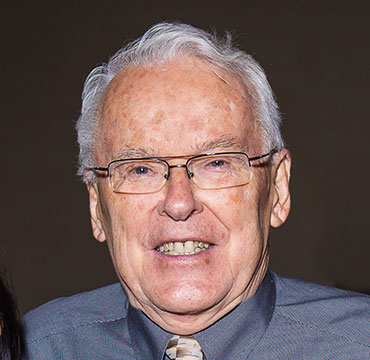Speakers Directory
As Minnijean likes to say, “Ordinary people can do extraordinary things.”
Key to the living-history component of the Sojourn experience are the speakers, the ordinary people, who offer unique historical insights about key events of the Civil Rights Movement based on their personal experiences. At each location we visit, participants conduct in-depth studies of their stories before meeting and interviewing the speakers. We are so fortunate to have them!
Speakers Directory
As Minnijean likes to say, “Ordinary people can do extraordinary things.”
Key to the living-history component of the Sojourn experience are the speakers, the ordinary people, who offer unique historical insights about key events of the Civil Rights Movement based on their personal experiences. At each location we visit, participants conduct in-depth studies of their stories before meeting and interviewing the speakers. We are so fortunate to have them!
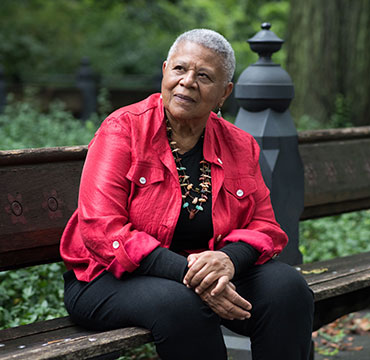
Minnijean Brown-Trickey
She is famously a member of the “Little Rock Nine,” but to us she is also the “Queen of Sojourn” and has traveled on nearly every Sojourn journey. She has dedicated her life to peacemaking, environmental justice, developing youth leadership, diversity education and training, cross-cultural communication, and gender and social justice advocacy. Under the Clinton Administration, she served as Deputy Assistant Secretary for Workforce Diversity at the Department of the Interior, and also has taught numerous university courses on social work and cross-cultural communication.
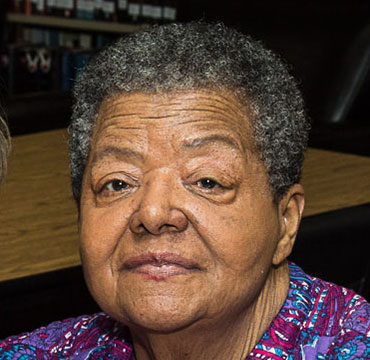
Elizabeth Eckford
Ms. Eckford is another member of the “Little Rock Nine.” She attended Central High School from September 1957 until Governor Oral Faubus closed all schools in Little Rock in another attempt to prevent desegregation. She then moved to St. Louis, Missouri, where she finished her high school education. Elizabeth later participated in the famed March on Washington in 1963, and joined the U.S. Army in 1967. She now lives in Little Rock and works as a probation officer. She meets every Sojourn group and recounts her experiences with prejudice and the toll it took on her life; she is quick to emphasize the power of kindness and how young people can make a difference in one another’s lives.
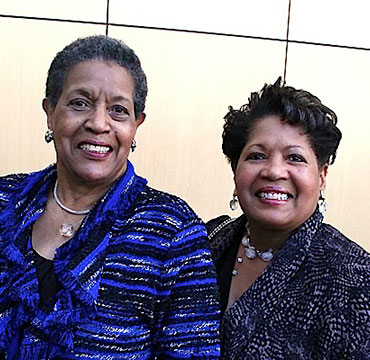
The Evers Family
Myrlie Evers-Williams is the widow of slain civil rights leader Medgar Evers. After witnessing his murder, she struggled for many decades to get justice. Throughout her life, she has dedicated her activism to the fight for civil rights and equality. She was the first Chairwoman of the NAACP. Most recently she gave a powerful keynote address at the opening of the Mississippi Civil Rights Museum, and contributed op-eds to national newspapers about the current fight for equality. Reena Evers has worked for decades as a communications representative with domestic and international entities. She is a frequent speaker at conferences and conventions, and has served on numerous organization boards and committees to advance equity and justice. She serves as the Executive Director for the Medgar and Myrlie Evers Institute, motivated by her father’s words: “Although great strides in the field of human relations have been made, we cannot let up now!”
On January 21, 2013, Evers-Williams delivered the invocation at the second inauguration of Barack Obama. She was the first woman and the first layperson to deliver the invocation at a presidential inauguration.
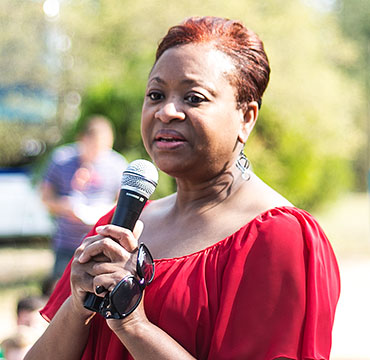
Angela Lewis
Angela Lewis’ father James Chaney was born May 30, 1943 in Meridian, Mississippi to Ben and Fannie Lee Chaney. In 1963, he joined the Congress of Racial Equality (CORE). In 1964, CORE led a massive voter registration and desegregation campaign in Mississippi called Freedom Summer. As part of the Freedom Summer activities, Chaney was riding with two white activists when they were attacked and killed by the Ku Klux Klan on June 21, 1964. After numerous attempts, the family finally received a small measure of justice in 2005 when Edgar Ray Killen was found guilty of manslaughter and sentenced to 60 years in prison. Ms. Lewis was just 10 days old when her father’s life was taken. She recounts her father’s activism from a young age and delivers an inspirational message about how young people can transform their communities.
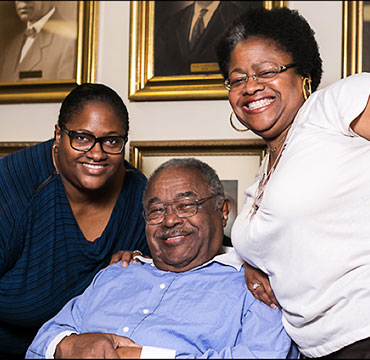
The McNair Family
On September 15, 1963, the Sixteenth Street Baptist Church in Birmingham, Alabama was bombed in a terrorist attack by white racists who opposed desegregation. Sunday school pupils Addie Mae Collins (14), Carole Robertson (14), Carole Robertson (14), and Denise McNair (11) were killed. The McNair family recounts the story of their daughter’s death, as well as the public environment at the time of the bombing. Despite their devastating loss, they believe that “hatred only destroys the hater” and so they emphasize empathy and creating positive and inclusive communities.
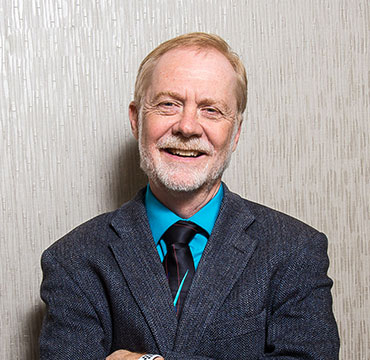
Jerry Mitchell
He is an investigative reporter for The Clarion-Ledger newspaper in Jackson, Mississippi, and is the leading civil rights reporter in the country. He persuaded authorities to reopen seemingly cold-case murder cases from the Civil Rights Era, prompting one colleague to call him “the South’s Simon Wiesenthal.” His investigations have led to the arrest of several Klansmen and prompted authorities to reexamine numerous killings during the Civil Rights Era. Mitchell’s work so far has helped put at least four Klansmen behind bars: Byron De La Beckwith, 1963 assassin of NAACP leader Medgar Evers; Imperial Wizard Sam Bowers for ordering the fatal firebombing of NAACP leader Vernon Dahmer in 1966; Bobby Cherry for the 1963 bombing of the Sixteenth Street Baptist Church in Birmingham that killed four little girls; and most recently, Edgar Ray Killen, for helping to orchestrate the killings of Chaney, Goodman, and Schwerner. He has received the MacArthur Genius Grant for his efforts.
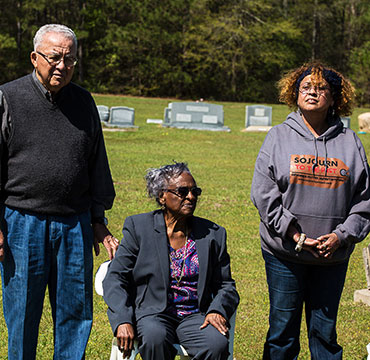
The Dahmer Family
Vernon Dahmer Sr. was a successful businessman and voting rights activist in Hattiesburg, Mississippi. He had offered to pay the poll tax for any African American seeking to register to vote. He would often say, “If you don’t vote, you don’t count.” In retaliation for his efforts, the Dahmer home was firebombed on the night of January 10, 1966. As Dahmer’s wife and children escaped the inferno, gunshots were fired and Vernon returned to fire from within the house [don’t understand what this means, unclear]. He was severely burned about the head, face, arms, and upper body before he could escape and meet up with his family. His 10-year-old daughter Bettie also suffered painful burns. The Dahmer home, grocery store, and car were destroyed and Vernon succumbed to his injuries the following day. His surviving family members speak to Sojourn students to convey the importance of voting and civic engagement.
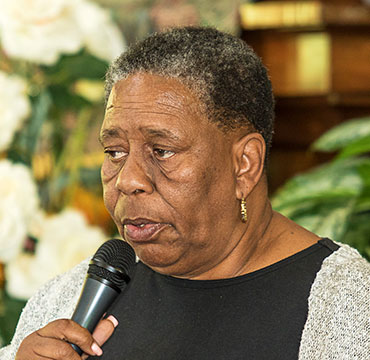
Joanne Bland
In her lifetime, she has been a witness and participant in some of the nation’s most consequential civil rights battles. She began her activism in 1961 as an 8-year-old attending freedom and voters’ rights meeting presided over by the Rev. Dr. Martin Luther King Jr. and the Student Nonviolent Coordinating Committee (SNCC). Bland who was only 11, along with other young activists in Selma, marched on “Bloody Sunday” and “Turn Around Tuesday,” witnessing brutal beatings, shootings, and hosing of fellow marchers by police. She has the distinction of being the youngest person jailed in these demonstrations. She continues to be active in local and regional organizations devoted to expanding and securing fundamental liberties. She is the co-founder of Journeys for the Soul Museum in Selma, Alabama, where she works to promote civil and human rights and in particular seeks to increase voter awareness.
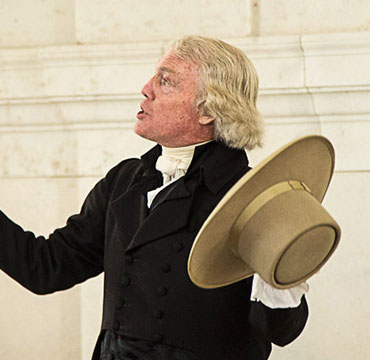
Bill Barker
Bill meets with our Middle School groups on our Washington, D.C. program. He is the leading Thomas Jefferson re-enactor in the country, and his historical knowledge of Jefferson’s legacy adds great depth and understanding to our curriculum.
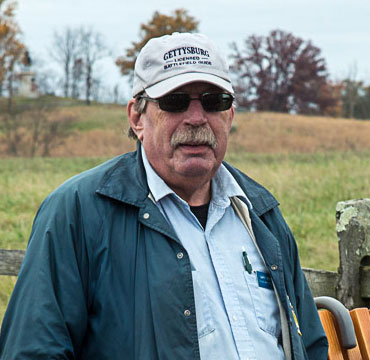
Gary Cross
Gary meets with our Middle School groups when they travel to Gettysburg. He is one of the leading Gettysburg historians in the country. In addition to his work with the National Park Service, he spends the day with our students educating them about landmark locations around the battlefield. This pivotal moment in U.S. history is brought to life with vivid clarity, and students walk away with a new appreciation thanks to Gary’s enthusiastic teaching.
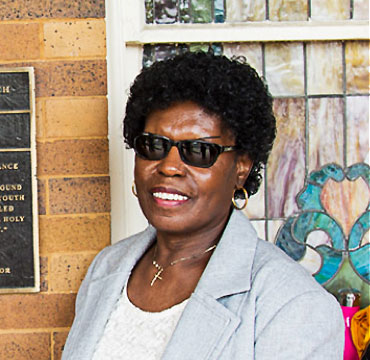
Sarah Collins
Sarah was the fifth little girl in the Sixteenth Street Baptist Church Bombing in Birmingham. At age 9 she was the only one to survive. Her sister Addie Mae, along with Denise McNair, Cynthia Wesley, and Carole Robertson were murdered that day by a bomb planted specifically in retaliation for the Children’s March that had occurred the previous spring. Sarah meets us in the Church’s sanctuary to share her story, and how she overcame the hatred she felt in the wake of the bombing.
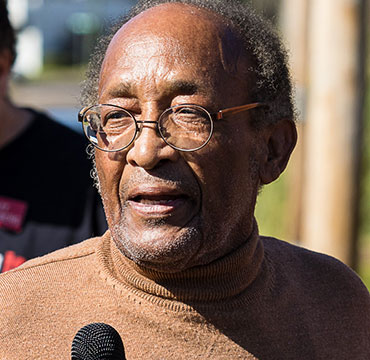
Coach Lawrence Huggins
Coach was young teacher when he left his job in order to lead the first group of professionals to protest for the right to vote in Selma, Alabama at the Dallas County Courthouse. His small stature did not prevent him from standing up to the very intimidating Sheriff Jim Clarke. Clarke’s tactics could not overcome Coach’s huge heart and unstoppable spirit. He speaks to Sojourners about the Selma Campaign and leads us on a tour through the city.
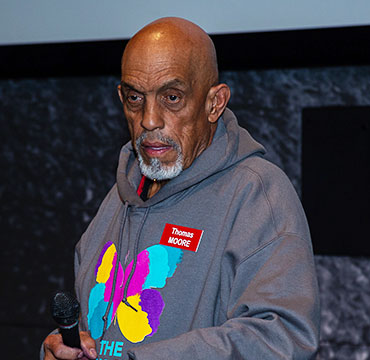
Thomas Moore
In May of 1964, when his brother Charles Moore and his friend Henry Dee went missing, Thomas Moore wasn’t sure what happened. He was stationed with the Army at Fort Hood, Texas when he heard the news that the remains had been discovered in the Mississippi River. Since that June day, he has searched for justice for the two teenagers. He had to wait over 40 years to find out the circumstances of their kidnapping, torture and eventual murder at the hands of James Ford Seale and other Ku Klux Klan members. Eventually, he and Canadian Broadcast Journalist David Ridgen were able to gather enough evidence to convince the Federal Attorney to take the case to trial. Thomas is a Vietnam veteran, he retired as an E-9 Command Sergeant Major, and now lives in Colorado Springs where he serves as deacon at his church, and works to keep the memory of his brother Charles and Henry Dee alive.
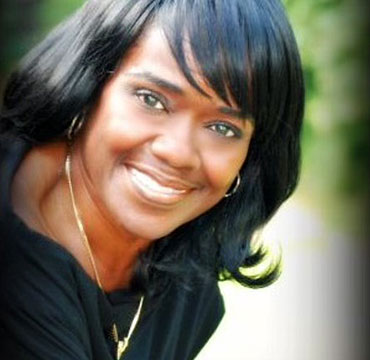
Gwen Webb
Rev. Gwendolyn Cook Webb, was born In Birmingham, Alabama. Rev. Webb’s grandmother would always say, she came into the world with her eyes opened and her head moving, she knew she had been called but, being a female, she didn’t know how she was going to do it.
In 1963, Rev. Webb’s calling came into view after hearing, Rev. Dr. Martin Luther king at 16 Street Baptist Church. After hearing Dr. King and responding to his call for help in Birmingham, Alabama, but he wasn’t talking about the children.
Dr. King sent for his organizer from Mississippi, Dr. James Luther Bevel. Dr. Bevel organized the children and I was called out as one of the student leaders to assist. After a nonviolent movement of thousands of children going to jail, we the children, turned a very racist city that was upside down, right side up, nonviolently with Dr. Bevel teaching and believing in us to be obedient. I was 14 years old. I was later called to preach. I had a brother who was also a preacher and a very intricate part of the movement.
During the movement, a lot of people, including my mother thought the kids were going to get hurt. The reality of it all was, being black and in Birmingham, Alabama, we were going to continue to get hurt, if we didn’t do something. My next calling was to get on the racist police force as the second black female cop in Birmingham, Alabama. None of this was easy but, Thank God, I made it.
I am very thankful to my brother, my Sojourn Project family!!!!
Thank God I made it!!
In Memoriam
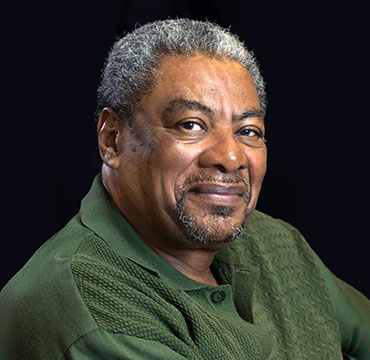
Joe Selmon
Joe Selmon knew growing up in Jim Crow Alabama that something wasn’t right. He remembers shopping in store basements instead of upstairs with the white people. He recalls the indignity of paying for the bus fare with his mother, only to have to get off of the bus, walk to the back entrance, and have the driver pull off because the back was “too crowded” for them to fit. He remembers walking by the police station and seeing Bull Connor’s white tank parked outside. When the call came in 1963 for the children of Birmingham to make a stand, Joe was ready. As older kids walked by his elementary school that morning in May he walked out of his classroom and marched to 16th Street Baptist Church. At just 10 years old he and hundreds of others faced the fire hoses and attack dogs in Kelly Ingram park. They helped to bring national attention to inequality brought about by segregation and intense racism. Today Joe is a member of the Equal Justice Initiative and speaks to young people about the urgent need for civic participation, voting and the power of speaking out against injustice.
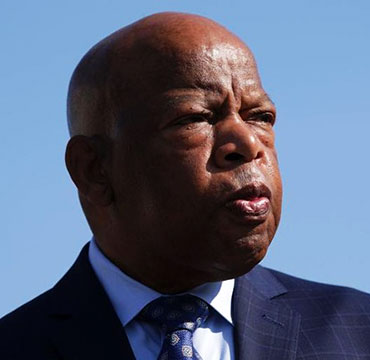
U.S. Congressman John Lewis
John Lewis grew up on his family’s farm and attended segregated public schools in Pike County, Alabama. As a young boy, he was inspired by the activism surrounding the Montgomery Bus Boycott and the words of the Rev. Martin Luther King Jr., which he heard on radio broadcasts. In those pivotal moments, he made a decision to become part of the Civil Rights Movement. Ever since then, he has remained in the vanguard of progressive social movements and the human rights struggle in the United States. By 1963, he was dubbed one of the Big Six leaders of the Civil Rights Movement. Despite more than 40 arrests, physical attacks, and serious injuries, John Lewis remained a devoted advocate of the philosophy of nonviolence. He has been generous to our organization and has met with more than 80 groups.
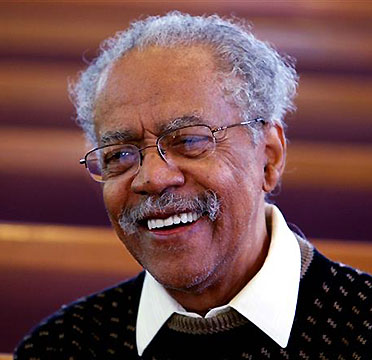
Reverend Billy Kyles
After Memphis sanitation workers went on strike in February 1968 due to low wages and inhumane working conditions, Kyles helped to form and lead the effort to gain community support for the striking workers. Part of that effort involved persuading Dr. King to come to Memphis in support of the workers. Throughout King’s final days, giving his last speech, working side by side with local ministers and leaders, Rev. Kyles witnessed these efforts. He spent time with Dr. King during the final hour of his life, and also with Rev. Ralph Abernathy. For several Sojourn students lucky enough to meet Rev. Kyles, he described that final hour, and the work Dr. King was so dedicated to. Rev. Kyles believed that Sojourn students would have “a different sensitivity because Sojourn has allowed them not just to touch history but to touch those who made history.”
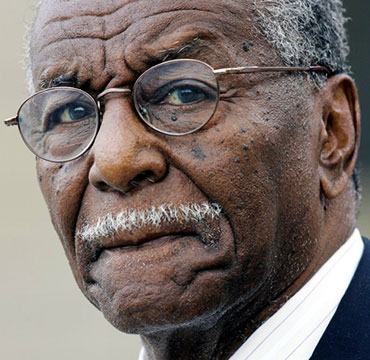
Reverend Fred Shuttlesworth
The world lost a great warrior for justice in 2011. Fred Shuttlesworth was a civil rights activist and minister from Birmingham, Alabama. He worked tirelessly to desegregate the city and end other forms of racism. He survived numerous beatings, assassination attempts, and despite the constant threats he refused to stop organizing for change. He is credited with helping bring Dr. King to Birmingham, and we were blessed to have him speak to numerous Sojourn groups over the years.
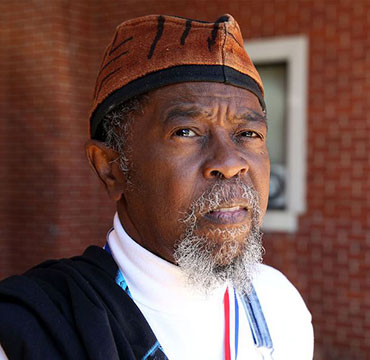
Reverend Jimmy Webb
Jimmy Webb was small in stature but mighty in soul. His passion and energy inspired many Sojourn students over the years. Jimmy was a devoted activist in the Selma Movement for voting rights, and at the young age of 16, he led a group of protestors out of Brown Chapel around a police barricade when they were approached by Sheriff Jim Clark and a posse of officers. When confronted with hostility, Jimmy employed nonviolence to question the obvious hatred he faced from the Sheriff. He believed in nonviolence, and encouraged students to confront injustices they saw with peaceful means, too.
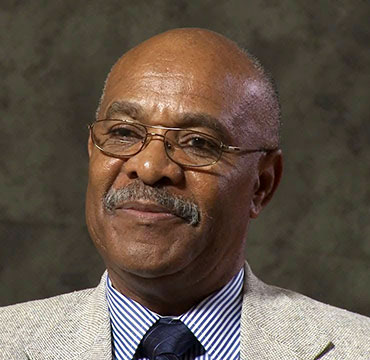
Simeon Wright
Prior to his passing in 2017, Simeon spoke to numerous Sojourn groups to tell the story of his cousin Emmett Till, who was visiting him from Chicago when he was kidnapped, tortured, and murdered. While Simeon directly witnessed the kidnapping, his life was forever changed by the event. Emmett’s brutal death is widely believed to have kick-started the Civil Rights Movement, and Simeon shared the poignant lessons he took from the tragedy.
